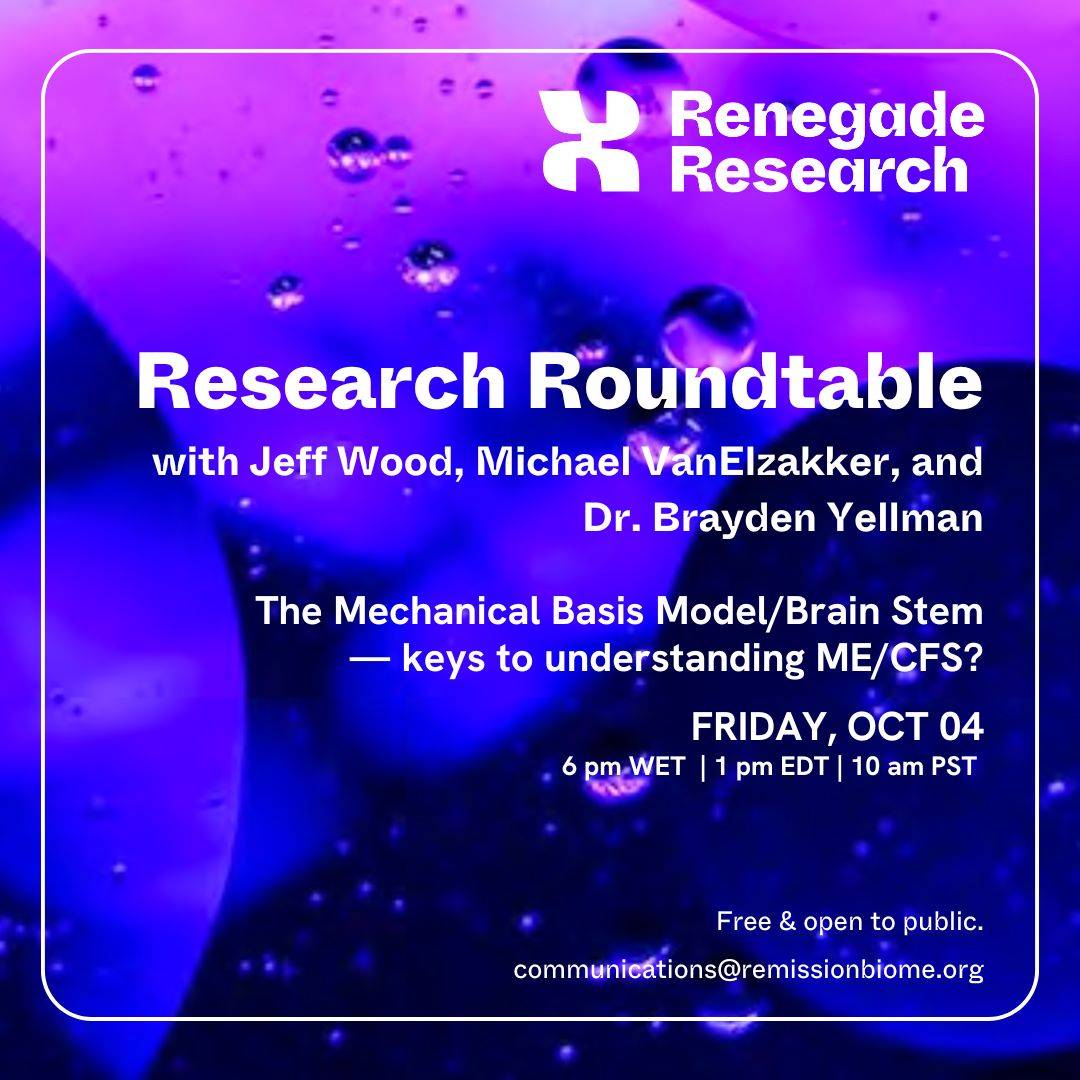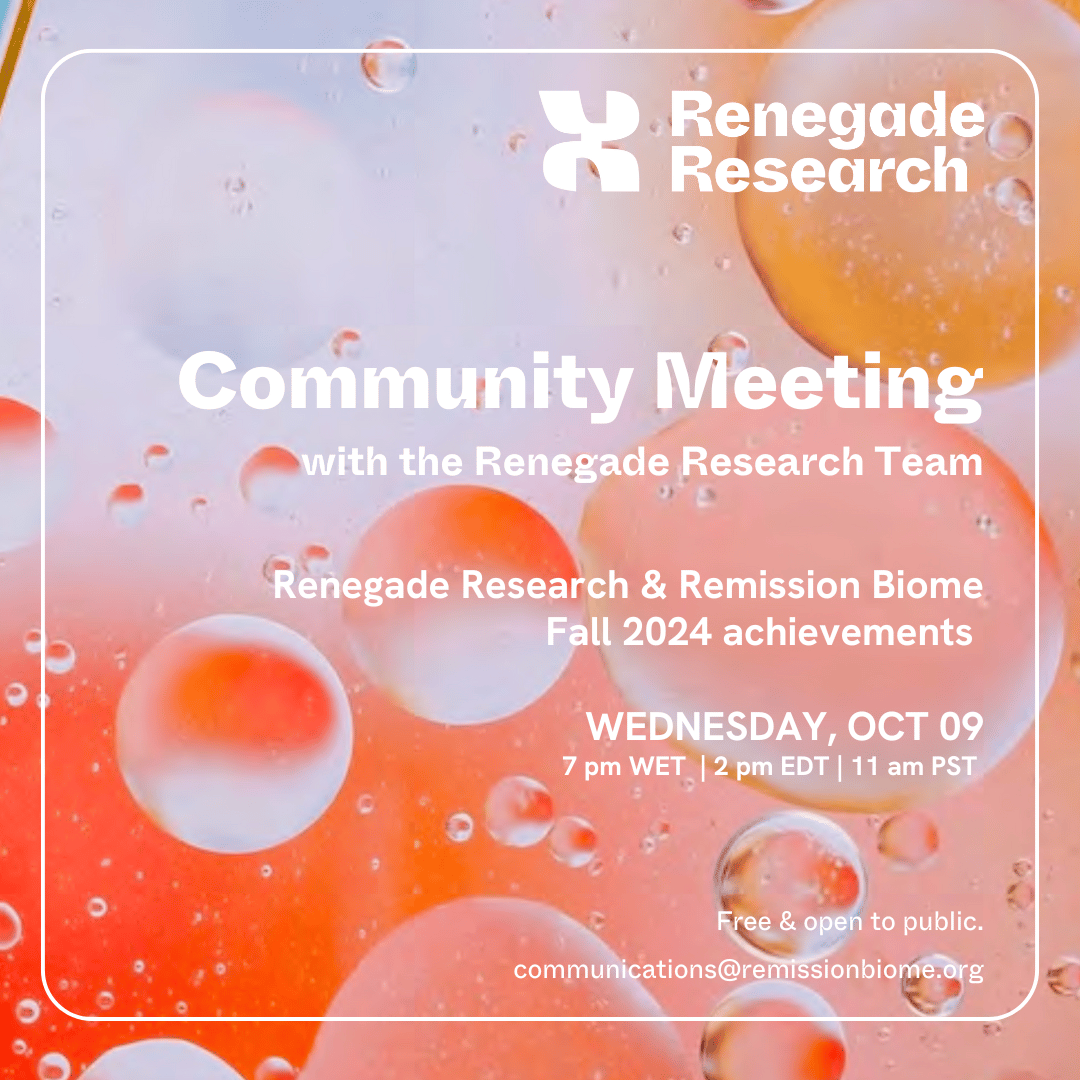|
We're back with part 3 of our Renegade Research Fall 2024 Update: Remission Biome!
Before we go into this week's newsletter, if you missed our previous ones, here is Part 1 and Part 2. Part 1 was focused on Renegade Research organization and team, and Part 2 highlighted our awareness and education work so far.
Ok, let's talk about Remission Biome!
There is a big probability that Remission Biome is the reason why you know of us.
It is our biggest project to date, specifically in number of people involved, health support level and data analysis.
So today we want to share with you the developments we had regarding protocol structure changes, Renegade50 progress, inside insights, new science, and other exciting news.
After this update we will be back in the coming weeks with a new newsletter format focused not only on Renegade Research activities and discoveries, but also on other initiatives from other people and orgs. We hope we are able to bring something of value to you, and if you have any ideas or feedback for us, just hit reply — we love to hear from you.
A sincere thank you for being part of our community, for supporting us, and following the amazing Renegade50! 💙
See you soon,
The Renegade Research Team
P.S.: By the way, next week we will present all of these updates and answer questions in our Fall 2024 Community Meeting on Wednesday, October 09. We hope to see you there — and if you want to send questions to us beforehand, just reply to this email.
|
|
|
|
|
ACTION REQUIRED
Update Your Email Preferences
As we kickstart new research projects and create more educational content and resources, please check our new subscription options to make sure you won't miss any new updates!
|
|
|
|
Upcoming Events

Research Roundtable
FRIDAY, OCT 04 (TODAY!)
In this Research Roundtable Jeff Wood, Michael VanElzakker and Dr. Brayden P Yellman will discuss The Mechanical Basis Model, specifically the Brain Stem Deformation and its potential to understanding ME/CFS.
Jeff Wood works on a Neuro Research Team. He solved his own case of post-viral ME/CFS and then built a new model of the pathophysiology of ME/CFS, which he calls “Mechanical Basis”.
Michael VanElzakker, PhD, is an Assistant Professor in the Division of Neurotherapeutics at Harvard University and a neuroimmunologist with expertise in persistent central nervous system consequences.
Brayden P Yellman, MD, is a board-certified physician in internal medicine and rheumatology at Bateman Horne Center.
|
|

RR Community Meeting
WEDNESDAY, 09 OCT
Join us in this webinar as we walk you through all of the new breakthroughs, achievements, changes and lessons learned along the past few months.
We'll discuss next steps and where we're headed with Renegade Research.
Questions welcomed — send us your questions in advance by replying to this email or join us live!
|
|
|
|
Renegade50 Protocol Learnings
Based on our pilot study in early 2023, we expected participants to complete the Remission Biome protocol within 3-6 months. However, every participant came into our study with unique challenges.
The challenges included everything from addressing comorbidities like MCAS, dealing with shipping logistics, wrangling our team’s size, and providing varying levels of support for participants living with different levels of disease.
We took a step back in February this year and redesigned the protocol stages to allow for greater individualization up front. This meant bumping the protocol up to six stages from our initial three.
Stage 1 now involves a more individualized approach that addresses barriers to success and “primes” the system for the antibiotic stage (as monitored and prescribed by participants’ healthcare providers).
We also developed a baseline optimization-only track, since some participants experienced significant baseline increases during Stage 1, and continue to make gains without going through the acute (antibiotic) phase.
|
|
|
Remission Biome Growth
Remission Biome started as a grassroots, community science project that quickly gained support and attracted amazing people from the patient/caregiver community — you can read more about our progress on our website.
In 2023, the Remission Biome project expanded from an N=3 pilot study in March to a group of 10 patients who were incidentally prescribed antibiotics for an infection and utilized part of the protocol (called the "1.5 group") during April-July.
In August 2023 we put out a call for 50 participants — the Renegade50. What happened was nothing less of incredible: over 500 applicants responded, reflecting just how many in our community see the need for patient-driven science.
The Renegade50 were then selected, an international group of amazing humans living with ME/CFS and Long COVID of varying severity and duration.
In the following months, as we were uncovering our first research insights, the project started to be recognized and welcomed beyond our Twitter community, allowing us to connect with nonprofit organizations, academia, health institutions and even getting featured by media publications.
This was a confirmation for us that Remission Biome and other patient-led research projects are key to accelerate accessibility to diagnosis and treatments — so it is our goal to not only improve this project, but to do it in a way that allows us to scale faster.
|
|
|
Data and Metrics
Renegade50 participants continue to collect data, which includes labs, tracking daily interventions and symptoms, wearable data, Braincheck cognitive testing, validated questionnaires, and more.
We’ve now had seven R50 participants (in addition to the pilot and the 1.5 cohort) complete the antibiotics phase, and we're receiving lots of interesting results. Many participants will complete the protocol in the next few months.
Our data analysis team is setting up structures for data sharing, building analysis tools, and analyzing the R50 data. Our goal is to create algorithms that can be repurposed to streamline future RR projects.
|
|
|
Community & Support
A beautiful camaraderie has sprung up between participants in the Remission Biome project. The R50 have a protected Slack space where they can discuss the protocol, new discoveries about ME/LC, and share wins/challenges.
"I've been really impressed by the willingness of the group to share information and tips, and information from other participants has really helped me out as well" — shares U.S. participant Lisa Bailey.
Sharing science is important too. “The Renegade Research Roundtables have given me up-to-date clinical and research information for ME/CFS and LC that I likely wouldn’t have gotten elsewhere,” says participant Elly Brosius.
R50 participants also have access to weekly small groups meetings for protocol support. Participants can drop into weekly emotional support meetings, Q&A sessions, and “geek” meetings to discuss complex science topics.
Participants involved in the program also receive weekly emailed summaries of R50 activity, and have access to recordings if attendance is impossible due to low spoons.
Everyone in the Renegade50 receives 1:1 meetings throughout the protocol, particularly during Stage 1 (the individualized preparation phase). As we’ve learned, the prep stage can last longer than expected for participants with more extensive challenges.
|
|
|
The Next Cohort
We initially anticipated that the next cohort would start in January 2024, but we needed extra time to implement changes designed to streamline the process and facilitate ease of participation. As patients ourselves, we also needed to ensure we’d have the bandwidth to support future cohorts.
We’re also integrating more volunteers in preparation for the next cohort launch date.
When the time comes — and we hope it will be soon — we'll be announcing the release of the protocol in this newsletter and both on @RemissionBiome and @RenegadeRes on Twitter, so please follow us there!
If you want to participate in the Remission Biome protocol and/or other future Renegade Research projects and protocols please join the waiting list here.
|
|
|
SUPPORT US
Help us in our mission to accelerate progress in research, clinical care & education by making a tax-deductible donation
Tax receipts will automatically be emailed
to you after your donation.
|
|
|
|